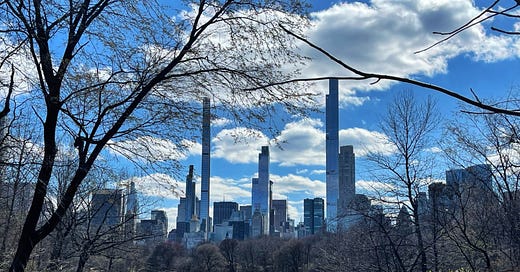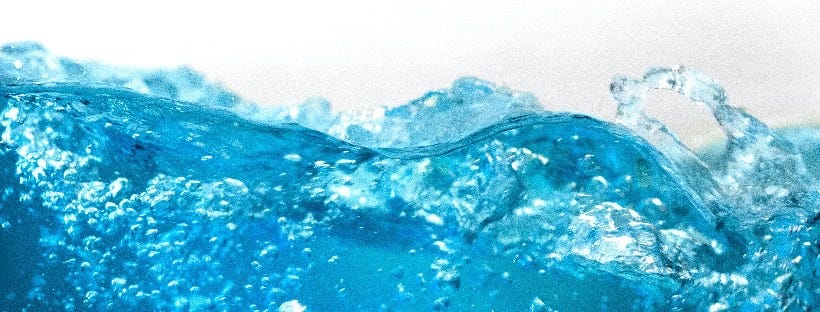
The UN 2023 Water Conference will take place March 22-24 in New York City. It is a midterm review of the Water Action Decade, which will raise awareness of the importance of water and mobilize action to address global water-related challenges.
Take a moment to think about the following numbers:
About 300,000 children under five die every year from diarrhoeal diseases due to poor sanitation, poor hygiene, or unsafe drinking water. These deaths could have been avoided by access to the daily clean water situation that most readers of this newsletter are used to.
2.2 billion people lack access to safely managed drinking water services
Over half the global population, 4.2 billion people, lack safely managed sanitation services.
What do you feel when you read these numbers? Are you shocked? I have seen the numbers too often to feel shocked, but I can't see them without feeling a deep disappointment about our slow progress towards the goals of Agenda 2030.
Inequality
I feel embarrassed and angry about our world's extreme inequality. Billionaires fly in space for fun while babies die because of poor sanitation and unsafe drinking water. We don't need rocket science to solve these problems; we know how to clean water and build a toilet. We need the political will.
And let's not forget that we talk about human rights in case anyone needs more convincing; in 2010, the UN General Assembly recognized the human right to water and sanitation. So, for instance, everyone has the right to enough water for personal and domestic uses, which is between 50 and 100 liters of water per person per day. And the water must be safe, acceptable, and affordable.
Water plays a fundamental role in sustainable development and is indispensable for social and economic progress, energy and food production, healthy ecosystems, and human survival. Moreover, water is crucial in adapting to climate change, as it is the essential link between society and the environment.
As the world's population grows, it becomes increasingly essential to balance the competing demands on water resources to ensure that communities have enough to meet their needs. In particular, women and girls must have access to safe and clean sanitation facilities to manage menstruation and maternity with dignity and safety.
At the individual level, it is crucial to recognize that water cannot be viewed in isolation from sanitation. Both are essential to reducing the global disease burden and improving populations' health, education, and economic productivity.
A conference to deliver on promisses made
Despite its significance, water scarcity and poor quality remain significant global challenges. In response, the United Nations is holding the 2023 Water Conference, a high-level event that will bring together water experts, policymakers, and stakeholders to discuss the importance of water and find solutions to the water-related issues facing our world. The aim of the conference is not to negotiate new commitments, but to make sure that countries deliver on promises already made
The conference will have five interactive dialogues, each focusing on water management and governance. These dialogues are:
Water for Health: Access to WASH, including the Human Rights to Safe Drinking Water and Sanitation
Water for Sustainable Development: Valuing Water, Water-Energy-Food Nexus and Sustainable Economic and Urban Development
Water for Climate, Resilience, and Environment: Source to Sea, Biodiversity, Climate, Resilience, and DRR
Water for Cooperation: Transboundary and International Water Cooperation, Cross-Sectoral Cooperation, including Scientific Cooperation, and Water Across the 2030 Agenda
Water Action Decade: Accelerating the implementation of the objectives of the Decade, including through the Action Plan of the UN Secretary-General.
The Water Action Agenda
The 2023 Water Conference is expected to be a milestone event in the global effort to address water-related challenges. It will provide an opportunity to share best practices and lessons learned, foster partnerships and collaboration, and mobilize resources and political will to achieve SDG6. But that doesn't make the conference the endpoint of a process. The co-hosts of the meeting, the Netherlands and Tadjikistan, have launched a Water Action Agenda to further amplify the conference's impact. It aims to provide a platform for groundbreaking initiatives to accelerate water action.
This Water Action Agenda is crucial because the world is currently lagging behind in achieving the water-related goals of the 2030 Agenda for Sustainable Development. So to effectively make a difference, the new commitments to achieve the earlier agreed goals of 2015 must be practical and action-oriented. We will need a fourfold increase in ambition. And it's important to note that addressing the water crisis is not the sole responsibility of governments; all sectors of society must be involved. Contributions from cities, regions, NGOs, and businesses will be vital in driving the success of the Water Action Agenda.
And a Dutch-NYC additional event: the New York Water Week
The Netherlands government and the City of New York also host the New York Water Week. This initiative is being organized alongside the UN 2023 Water Conference between March 18th and 24th and is independent of the United Nations. New York Water Week will feature various activities focused on water-related topics, in-person and online, throughout New York City. It's a vibrant mix of debates and activities contributing to the Water Action Agenda. The goal is to make the event accessible to as many people as possible and to ensure engagement and collaboration across sectors and communities.
If you got this far, please read this too:
I write this newsletter because I believe that together we can do better on this beautiful but fragile planet.
Please consider supporting this initiative by taking a paid subscription.
Notes:
https://sdgs.un.org/conferences/water2023
Photo by mrjn Photography on Unsplash
Photo by Daniel Sinoca on Unsplash









Thank you for detailing all of this, including the event itself. I wish I could be there!
Those statistics are truly staggering, and YES, 100% embarrassing to think of billionaires flying through space for fun and oligarchs out to sea on mega-yachts or going to parties by private jets whilst others die from famine and unspeakable unsanitary conditions. I hope that those with the power to enact positive change will do so.
Excellent article of need and outcomes to be addressed by the end of Water Week in NY. Great expectations from our best scientists and advocates around the world 🌍. Take joy in your work and meeting colleagues during the many sessions, formal and otherwise. The relationships that inevitably follow such intense discussions will be very useful in coming months and years. Everyone on the planet 🌍 is wishing for you a resounding success. After the meetings conclude, the challenges will be the follow through on commitments made, documenting progress in the media, so the truth of water 💦 action is clear to all! Congratulations on a comprehensive, well organized and thoughtful program. Thank you especially for your concern for girls and women who have so few rights! Well done! 🇳🇱